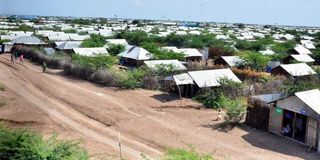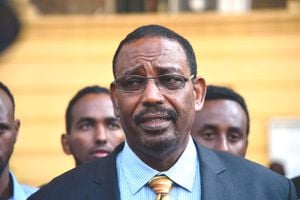Refugees flee to Ruiru after deadly clashes claim four lives at Kakuma

An aerial view of Kakuma 1 Refugee Camp located on the Kenya-Somalia border.
Ariet Okwier, 37, is a troubled woman following the latest flare-up of clashes at the sprawling Kakuma Refugee Camp.
On June 20, the single mother of one was forced to evacuate her family from the camp to Kakuma town following renewed conflict between refugees from the Anuak community of Ethiopia and the Nuer of South Sudan.
Ms Okwier fled with her five-year-old daughter, her mother and brother following the skirmishes that left four dead, including a three-month-old baby.
The ethnic row was ignited by a disagreement between boys from the two communities during celebrations to mark the World Refugee Day at Kalobeyei Integrated Settlement.
Tension between the Anuak, an agro-pastoralist group living in Gambella, located west of Ethiopia, and the Nuer, a pastoral community from South Sudan, has been high for some time.
The Nuer fled to Gambella after the 2013 South Sudan’s civil war leading to deadly conflict with their hosts fuelled by the scramble for resources.
Kakuma camp manager Edwin Chabari confirmed that at least four people were killed, while 44 others including women and children, were injured.
After the conflict at the camp, many of the residents fled and sought refuge in churches and police stations.
Commissioner for Refugee Affairs John Burugu in a statement on July 4 said that 3, 054 refugees had fled Kakuma to Ruiru in Kiambu. They hired public transport.
Attacked with pangas
"They stoned us from a distance. Two of my neighbours were attacked with pangas. I am mentally tortured by the sight of the bodies of those killed," Ms Okwier narrated with tears in her eyes.
"We have returned to a more insecure environment. Getting water is a challenge. Most of us are scared of taking our children to school for fear of being attacked," she added.
Ms Okwier recalled an incident in which a pupil was rescued from attackers.
"As women traders, we are scared to go to the market for fear of being attacked,” she said.
Mr Odhieng Akway, 45, a community leader, said the attacks that lasted 10 days forced many to flee.
"When we fled, our houses were looted and destroyed. Whenever we hold meetings to promote peace, animosity between the two ethnic groups is always reignited by petty crimes that can be sorted by existing local conflict resolution and security structures," Mr Akway said.
The refugees, commissioner, Mr Burugu, said: “Together with UNHCR and other partners, the Department of Refugee Services (DRS) has held peace meetings with the affected refugee communities culminating in a peace agreement that allows for the reintegration of refugees back into the camp.”
However, Mr Akway said that they returned involuntarily.
"We hurriedly buried two of our brothers at a cemetery after they were killed," he said.
Mr Akway asked the authorities to establish a police post between Kalobeyei and Kakuma 4. He also said that armed people should be blocked from accessing the camps.
"Better still, we should be relocated to Dadaab Refugee Camp far away from the Nuer community. Those willing to be repatriated should be allowed to save their lives," Mr Akway said.
Protect refugees
Anywaa Survival Organisation Director Nyikaw Ochalla criticised the forced return of refugees to the camp.
"This is neglect by authorities and that causes trauma to the victims. The forced return of refugees contravenes the obligation of Kenyan authorities to protect refugees," Mr Ochalla said.
Mr Opuro Oboho, another refugee, said that they had rejected the request by officials from UNHCR and DRS, urging those who had fled to Kalobeyei — about 20 kilometres away — to return to Kakuma Refugee Camp.
"We are terrified by the decision to force us to return because we will still be attacked," Mr Oboho said.
The refugees said they got hate and threatening messages on their mobile phones on WhatsApp groups, adding that their attackers took their phones.
But the camp manager maintained that security had been beefed up.
Turkana County Security Committee team led by County Commissioner Julius Kavita restricted movement in and out of the camps. More security officers have been deployed.
Mr Burugu said government is committed to protect refugees, asylum seekers and host communities.
The Department of Refugee Services reminded refugees and asylum seekers of their obligation to respect the law, maintain peace, and follow correct channels to communicate whenever they have grievances.




